
Top Online B2B Chinese Channels
By: ASHLEY DUDARENOK
Updated:
China is now the world’s fastest-growing hub for digital trade. In the first half of 2024, cross-border e-commerce reached 1.22 trillion yuan (US$171 billion), a 10.5% year-over-year increase. Giants like Alibaba, JD.com, and Pinduoduo are investing in supply-chain innovation, while Shein and Temu exploit the U.S. “de minimis” rule to ship low-value goods duty-free.
For global SMEs, Chinese B2B marketplaces have become essential. They offer verified suppliers, escrow protection, AI-driven sourcing, and global logistics. Platforms are racing ahead with AI agents, virtual trade shows, video factory tours, live-commerce, and new warehouse networks in Europe and North America.
This guide highlights the updates across leading B2B platforms. You’ll find what each channel offers, who it serves, and the features you can leverage today.
Key Trends in B2B Chinese Marketplaces
Cross-Border B2B Trade Growth
China’s export-led e-commerce boom is still accelerating. In 2024, cross-border e-commerce exports increased by 16.9% year-over-year, driving trade volume to 2.71 trillion yuan (approximately USD 373 billion).
This surge widened trade deficits in importing countries, fueling scrutiny of the de minimis loophole that exempts low-value shipments from tariffs. Yet demand remains strong, driven by low prices, a wide variety of products, and faster shipping times.
Innovation Across Chinese B2B Platforms
Chinese B2B platforms are evolving into tech-driven ecosystems rather than static directories. Recent upgrades include:
- AI-driven sourcing: Alibaba, Made-in-China, and TradeChina.com now use AI to match buyers with verified suppliers, analyze intent, and forecast demand.
- Social commerce models: Pinduoduo’s group-buying concept and Temu’s gamified shopping are adapted for bulk B2B orders, letting businesses unlock discounts through collective purchasing.
- Payment security: Escrow and trade assurance programs, now standard, release funds only after confirmed delivery has been made. This reduces fraud and builds buyer confidence.
- Virtual and hybrid trade shows: Global Sources and HKTDC host online exhibitions alongside physical fairs, enabling remote supplier meetings and contract negotiations.
AI, Data Analytics, and Digitalization
Artificial intelligence now extends beyond product recommendations. Platforms. TradeChina.com integrates price-tracking dashboards, while Yiwugo leverages video reviews to highlight trustworthy sellers.
Digital tools also streamline collaboration. In-app messaging, video calls, and document sharing reduce reliance on email, while digitally stored contracts and invoices simplify audits. These features make B2B trade more transparent and efficient.
Supply Chain and Logistics Transformation
Fast, predictable delivery has become a competitive edge. Platforms are investing heavily in localized logistics networks:
- Temu builds warehouses in the US and Europe and recruits local sellers to ensure 3–7 day delivery.
- Alibaba’s Cainiao offers end-to-end logistics with customs clearance and order consolidation.
- DHgate simplifies small-order shipping and expands express options.
- TradeChina.com integrates freight forwarding and customs brokerage, while Yiwugo focuses on bulk shipping solutions.
These investments reflect a clear shift: logistics is no longer just infrastructure, but a core differentiator in B2B competition.
Regulation and Trust
Stricter global regulations are reshaping digital trade. The EU Digital Services Act and the US moves to restrict duty-free imports are pushing platforms toward greater compliance. Many now enforce KYC checks, export-control screening, and real-time customs data integration.
Trust is becoming a brand asset. Alibaba’s Trade Assurance, DHgate’s escrow, and Yiwugo’s secure payments provide buyers with additional protection. Video reviews, verified supplier programs, and standardization efforts help reduce fraud while ensuring shipments clear customs smoothly.
With these trends in mind, let’s explore the top Chinese B2B channels for 2025.
Top Online B2B Chinese Channels to Watch
1 – Alibaba.com
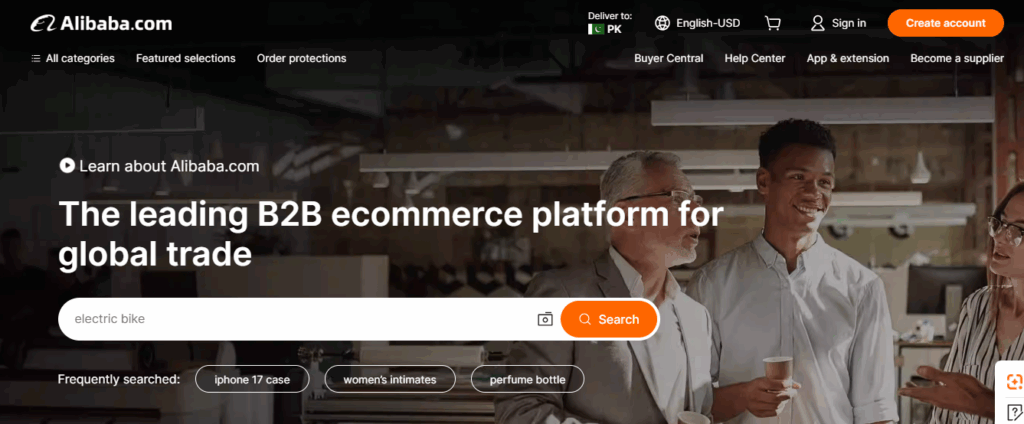
Audience: global buyers and sellers sourcing finished products, raw materials, and custom manufacturing.
Overview: Founded in 1999, Alibaba.com remains the largest Chinese B2B marketplace. By 2025, it will serve 40 million active buyers in 190 countries. Its catalogue spans electronics, machinery, textiles, and consumer goods.
2024–2025 Updates
- Alibaba Guaranteed program: In 2024, the company introduced the Alibaba Guaranteed program, which offers fixed prices, guaranteed delivery dates, and enhanced refund policies. The program also enhances supplier verification and utilizes AI-powered product matching to connect buyers with suitable factories. This service aims to make global sourcing “as simple as online shopping.”
- Trade Assurance and escrow payments: Alibaba continues to offer Trade Assurance, which holds funds in escrow until buyers confirm receipt.
- Integrated logistics: Alibaba has built global logistics solutions with local warehouse options to reduce transit times. For example, its Cainiao network provides end‑to‑end shipping and customs clearance.
- Mobile sourcing: A full-featured mobile app enables buyers to search for products, chat with suppliers, and track shipments.
Why it Matters
Alibaba’s scale brings diversity and competition among suppliers, which in turn lowers prices and enables customization.
The new Alibaba Guaranteed program simplifies purchasing for SMEs by locking in costs and shipping times, while AI improves sourcing efficiency. For many businesses, Alibaba remains the default gateway to China’s manufacturing base.
2 – Global Sources
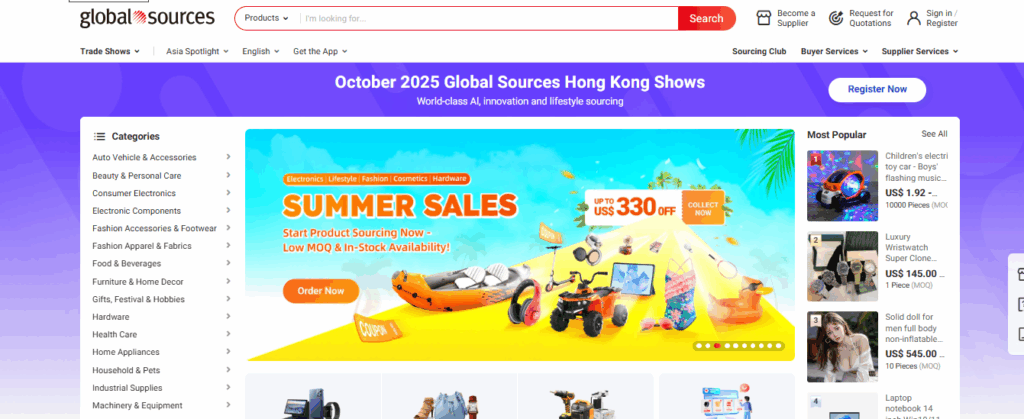
Audience: buyers seeking high‑quality suppliers for electronics, gifts, fashion, and consumer goods.
Overview: Global Sources is a Hong Kong‑based B2B marketplace founded in 1971. It is known for strict supplier vetting and is widely used by international buyers. The platform does not sell goods itself; instead, it acts as a bridge between buyers and verified suppliers.
2024–2025 Updates
- Revival of offline trade shows: Following pandemic-related disruptions, Global Sources revived its large-scale offline trade shows in Hong Kong during 2024–2025. These fairs complement the online marketplace, allowing buyers to inspect products in person.
- Video communication tools: The platform introduced video meeting tools for supplier discussions.
- Strengthened supplier verification: Global Sources has tightened its vetting to ensure that only qualified suppliers appear on the platform.
- Payment Protection and Logistics: Payment protection is available to premium members, and the site offers international shipping through logistics partners.
Why it Matters
Global Sources is especially strong in consumer electronics and gift categories. Its mixture of online sourcing and offline trade fairs helps buyers diversify procurement channels. The renewed focus on supplier verification and virtual meetings addresses trust and communication challenges in cross‑border sourcing.
3 – Made‑in‑China.com
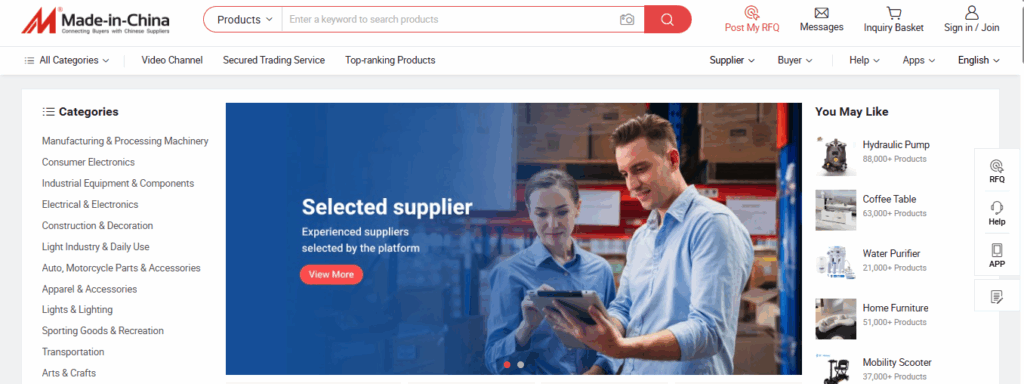
Audience: global importers seeking verified Chinese manufacturers across industrial and consumer categories.
Overview: Based in Nanjing and launched in 1998, Made‑in‑China.com has grown into a top‑tier B2B platform. By 2025, it is expected to have over 40 million registered buyers and services available in 11 languages. The site specializes in matching international buyers with Chinese manufacturers, offering certifications and factory audits.
2024–2025 Updates:
- Video presentations and virtual exhibitions: In 2024, the platform introduced video product presentations, online exhibitions, and rapid supplier verification services, including Onsite Check and Video Factory Tour. These features let buyers inspect factories and products remotely.
- Certification services: Made‑in‑China continues to provide supplier and dealer certifications; charges for certification are part of its profit model.
- Trade assurance and payment protection: Buyers benefit from payment protection similar to Alibaba’s escrow.
- Integrated logistics and tracking: The platform offers logistics solutions with tracking and consolidated shipping.
Why it Matters
With multi‑language support and rigorous verification, Made‑in‑China is a trusted resource for sourcing industrial machinery, building materials, consumer goods, and more.
The new video factory tours and virtual exhibitions, launched in 2024, help buyers conduct due diligence remotely—an important advantage during travel restrictions and for time-pressed procurement teams.
4 – 1688.com
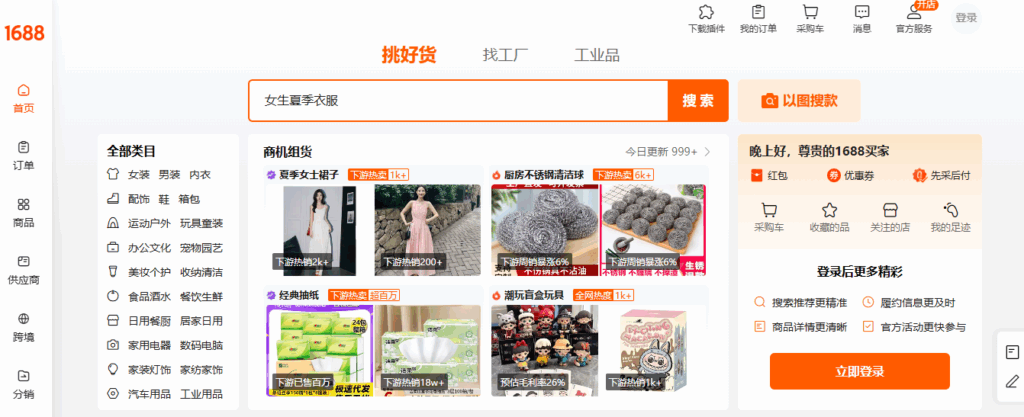
Audience: Domestic Chinese businesses and international buyers using agents to access lower prices.
Overview: 1688.com is Alibaba’s domestic wholesale arm, connecting small Chinese factories with local retailers. By 2025, it is expected to have 50+ million users. Many foreign SMEs utilize agents to secure lower prices than those available on Alibaba.com.
2024–2025 Updates
- English-language support via agents: 1688 introduced services that enable foreign buyers to communicate with suppliers in English through intermediary agents. This makes the platform more accessible to international users.
- Enhanced supplier verification: To increase trust, 1688 strengthened its vetting processes in recent years.
- Logistics focus: While logistics is mainly domestic, some agents now offer international shipping solutions.
- Mobile app: A mobile app lets buyers source and chat with suppliers.
Why it Matters
1688 provides SMEs with direct access to small-scale factories, offering factory-gate pricing. It requires agents for non-Mandarin buyers but often offers 15–30% lower costs.
5 – Makepolo
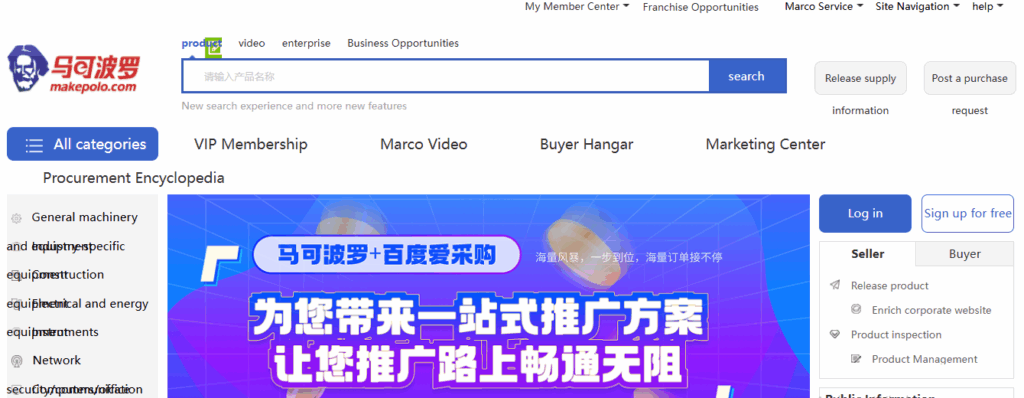
Audience: small and medium‑sized enterprises (SMEs) seeking precise search and advertising opportunities.
Overview: Makepolo, founded in 2006 and headquartered in Beijing, positions itself as a precision B2B search engine and advertising marketplace. It provides purchasing search services and advertising placement for SMEs, allowing buyers to find targeted products and suppliers.
2024–2025 Updates
- Advanced product search system: Makepolo’s search algorithms enable precise matching between buyers and suppliers.
- Advertising opportunities: Companies can purchase advertising placements to increase visibility within the marketplace.
- Support for Chinese SMEs: The platform primarily supports domestic SMEs by streamlining procurement processes and expanding their reach.
- Standard payment options and logistics: Although dedicated escrow services are limited, the platform’s reputation bolsters trust, and logistics are managed through suppliers or third-party partners.
Why it Matters
Makepolo appeals to SMEs that need an efficient search engine rather than a vast catalogue. Its advertising tools help suppliers stand out in a crowded market. However, international buyers should note that the platform lacks extensive escrow and logistics support, making supplier due diligence essential.
6 – Pinduoduo / Temu
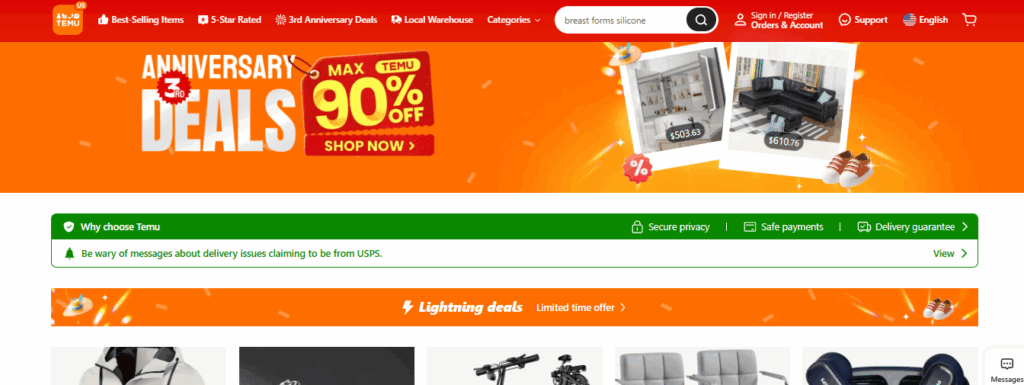
Audience: small wholesalers, dropshippers, and buyers seeking group‑buying deals or low‑cost goods.
Overview: Pinduoduo, launched in 2015, revolutionized Chinese consumer e‑commerce with its group‑buying model. Its international arm, Temu, launched in 2022 and has rapidly become a central cross‑border platform.
By 2025, Temu will operate in over 40 countries and is known for its aggressive pricing, group-buying discounts, and vast product catalogue.
2024–2025 Updates
- Rapid growth: Temu’s GMV increased from $290 million in 2022 to $14 billion in 2023 and $70.8 billion in 2024. The platform has 292 million monthly active users globally, including 185.6 million in the U.S.
- Business‑focused features: Temu launched “Temu for Business,” targeting small wholesalers and cross‑border sellers. It offers bulk discounts and integration with local warehouses.
- Local warehouses and sellers: To address regulatory and logistical challenges, Temu is establishing local warehouses and recruiting local sellers, thereby reducing delivery times and ensuring compliance with local regulations.
- Group‑buying and social features: Buyers can join group orders to unlock lower prices, and the platform uses gamified promotions and referrals.
- Payment Protection and Logistics: Payment protection and buyer guarantees are offered, and deliveries from local warehouses in the U.S. and Europe can arrive within 3–7 business days.
Why it Matters
Temu’s explosive growth shows the power of social commerce applied to wholesale sourcing. Its local warehouse strategy shortens delivery times and reduces customs complexity, while the group-buying model drives down prices. For small retailers and dropshippers, Temu provides an entry point into global sourcing with minimal barriers.
7 – HKTDC.com

Audience: buyers seeking premium consumer goods, electronics, and gifts, especially those interested in Hong Kong suppliers.
Overview: Operated by the Hong Kong Trade Development Council, HKTDC.com is a major B2B platform connecting Hong Kong and mainland Chinese suppliers with international buyers. The site hosts thousands of verified suppliers and is renowned for high‑quality products.
2024–2025 Updates
- Hybrid exhibitions: HKTDC hosts regular trade fairs that combine physical exhibitions with online platforms. In 2024–2025, the organization expanded its online exhibitions and introduced virtual business meeting tools, with a focus on premium segments.
- Strict supplier vetting and buyer protection: HKTDC verifies suppliers and offers payment protection.
- Logistics partnerships: The platform supports international shipping through trusted logistics partners.
- Mobile app: Buyers can search products and manage enquiries via a mobile app.
Why it Matters
HKTDC.com offers a curated selection of suppliers and facilitates networking through hybrid fairs. Its emphasis on quality and compliance makes it attractive to buyers of branded gifts, electronics, and lifestyle products. The new virtual meeting tools launched in 2024–2025 allow buyers to meet suppliers without travelling.
8 – DHgate
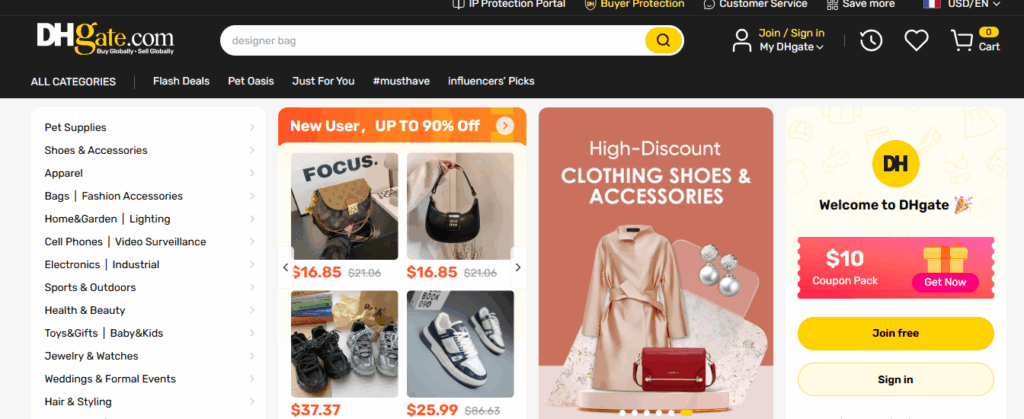
Audience: small businesses, entrepreneurs, and dropshippers seeking low minimum order quantities.
Overview: Launched in 2004, DHgate is one of the earliest cross‑border B2B e‑commerce marketplaces in China. It hosts millions of product listings from Chinese manufacturers and traders. By 2025, the platform is expected to have over 36 million registered users, 2.2 million sellers, and more than 34 million product listings.
2024–2025 Updates
- MyyShop and social commerce: In 2024, DHgate introduced MyyShop, a social‑commerce and dropshipping platform that allows influencers and small retailers to sell directly to their audience. This service integrates product sourcing, social media marketing, and logistics.
- Simplified logistics: DHgate offers simplified logistics for small orders, providing fast global delivery with tracking.
- Enhanced buyer protection: All transactions benefit from escrow payment protection, which reduces the risk of fraud.
- Mobile‑first: A comprehensive mobile app allows buyers to source products, chat with sellers, and manage orders.
Why it Matters
DHgate’s low minimum order quantities and focus on small businesses make it ideal for entrepreneurs testing new products or operating on a small scale. The MyyShop initiative demonstrates how B2B marketplaces are transitioning into social commerce and dropshipping, providing new channels for micro-enterprises.
9 – TradeChina.com
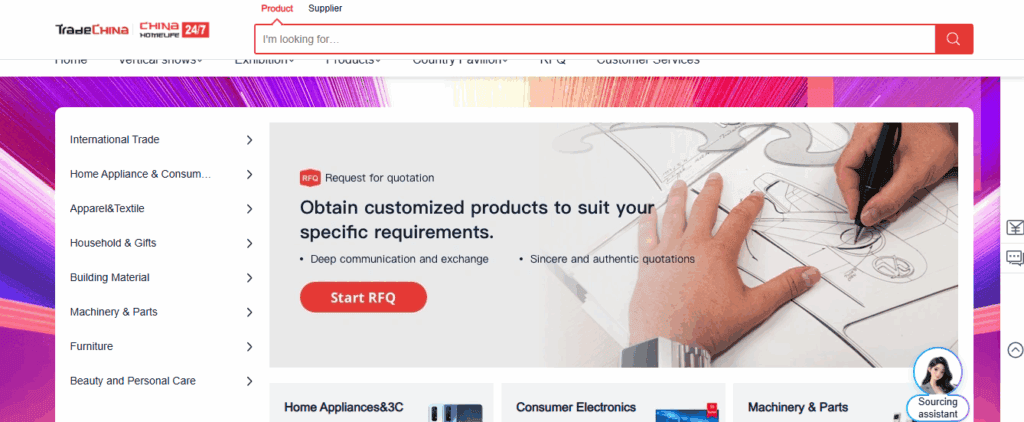
Audience: International importers seeking verified Chinese suppliers and streamlined sourcing tools.
Overview: TradeChina.com is a newer B2B marketplace that focuses on connecting Chinese exporters with global buyers. It emphasizes supplier verification, analytics, and integrated shipping solutions. As of 2025, the platform hosts hundreds of thousands of suppliers and millions of product listings.
2024–2025 Updates
- Expanded supplier base: TradeChina significantly expanded its supplier network and product catalogue.
- Automated market analytics and verification tools: The platform introduced tools that analyze product demand and verify suppliers, helping buyers identify reputable factories.
- Regional expansion: TradeChina is actively developing its presence in Southeast Asia and the Middle East.
- Escrow and payment protection: Payment protection is available to reduce transaction risk.
- Integrated logistics: The platform offers shipping solutions that provide transparency and efficiency in export processes.
- Mobile app: A mobile app supports sourcing and communication on the go.
Why it Matters
TradeChina.com is positioning itself as a modern, data‑driven alternative to established giants. Its analytics tools help buyers understand market trends and supplier reliability, while its regional expansion opens access to suppliers outside traditional coastal hubs. For businesses exploring new sourcing channels, TradeChina.com offers a balance of verification, analytics, and logistics support.
10 – Yiwugo.com
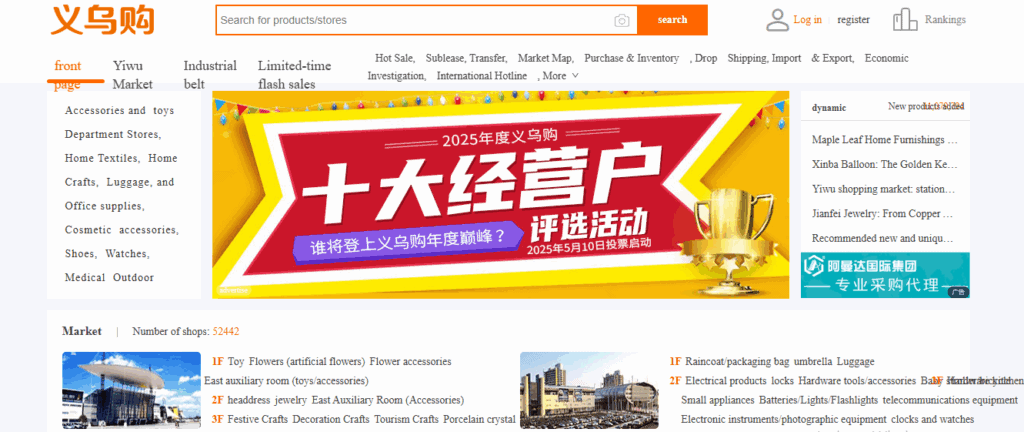
Audience: buyers seeking low-cost, high-volume goods, such as gifts, accessories, and household items.
Overview: Yiwugo.com is the official online platform of the Yiwu International Trade Market, the world’s largest wholesale market for small commodities. This marketplace is a vital channel for sourcing items in bulk at affordable prices. As of 2025, Yiwugo hosts over 70,000 suppliers and more than 3 million product listings.
2024–2025 Updates
- Video product reviews and virtual tours: Yiwugo added video product reviews and virtual market tours, allowing buyers to experience the vast Yiwu market remotely. These features have attracted more international buyers, particularly from Africa, Latin America, and Eastern Europe.
- Buyer base expansion: The platform has seen a significant increase in overseas buyers in 2024–2025.
- Payment options: While escrow services are limited, Yiwugo offers some secure payment methods.
- Bulk shipping focus: Logistics emphasizes bulk shipping with some international delivery options.
- Mobile app: A mobile app facilitates product searches and communication with suppliers.
Why it Matters
Yiwugo.com provides access to the enormous Yiwu market without requiring a physical visit. Its focus on low-cost, high-volume goods makes it ideal for retailers seeking inexpensive items to stock their stores or run promotional campaigns. The addition of video reviews and virtual tours demonstrates how even traditional markets are embracing digital tools to reach global buyers.
11 – ECVV.com
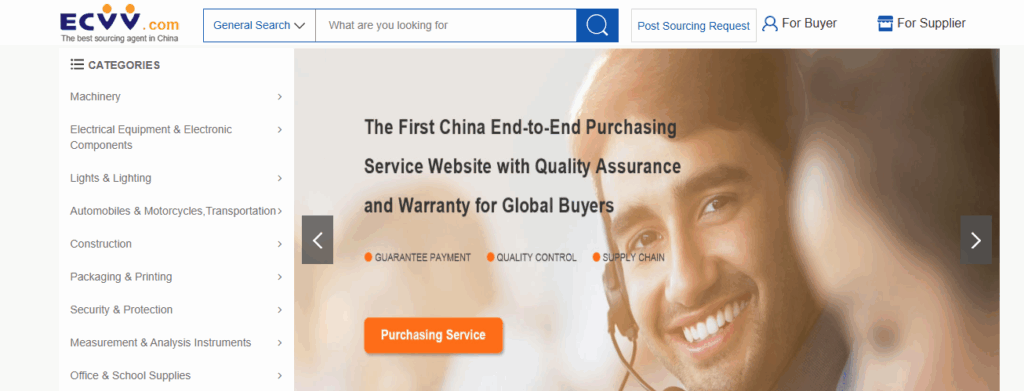
Audience: International buyers seeking a broad range of categories, including industrial machinery, electronics, textiles, and general consumer goods.
Overview: ECVV is a global B2B platform that connects buyers with verified suppliers in China. It provides access to a diverse product catalog focusing on industrial categories.
2024–2025 Updates
- Expanded supplier verification, including certificates and reports, to reinforce trust.
- Enhanced industrial machinery and electronics listings for B2B buyers.
- Broadened product scope to textiles, apparel, home decor, and hardware.
Why it Matters
ECVV offers a solid gateway for businesses importing both industrial and consumer goods. Its emphasis on supplier verification and product category depth makes it a reliable sourcing channel, especially for industries where due diligence is critical.
12 – DIYTrade.com
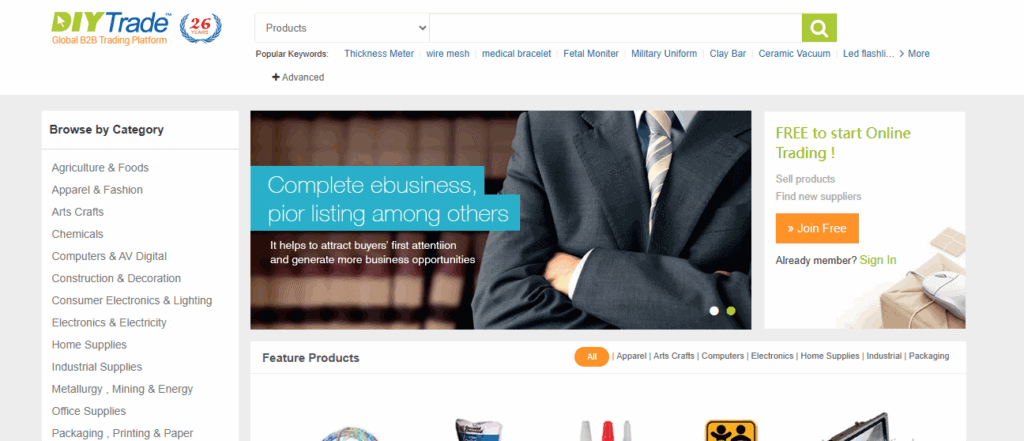
Audience: Buyers looking for building materials, furniture, home decor, tools, hardware, and fashion accessories from Chinese suppliers.
Overview: DIYTrade is a B2B marketplace that specializes in connecting global buyers with Chinese vendors across multiple verticals, including construction, furniture, and fashion.
2024–2025 Updates
- Improved interface and search capabilities for vertical-specific sourcing.
- Expanded listings in building materials, home furnishings, fashion accessories, and stationery.
- Strengthened supplier profiles to make sourcing easier for international buyers.
Why it Matters
For buyers in verticals such as furniture, tooling, or construction, DIYTrade offers a more targeted catalog compared to broader platforms. Its specialization reduces search friction and helps streamline the procurement process.
13 – eWorldTrade
Audience: SMEs, wholesalers, and importers sourcing consumer goods, electronics, textiles, and industrial products.
Overview: Founded in 2006 and headquartered in Shenzhen, eWorldTrade is a growing B2B marketplace connecting Chinese suppliers with buyers worldwide. It now serves over 500,000 registered buyers and provides multilingual support.
2024–2025 Updates
- AI-powered sourcing tools: Introduced product-matching algorithms and intent-based supplier recommendations.
- Virtual trade shows: Expanded online exhibitions for product launches and cross-border networking.
- Secure payments: Escrow-based protection reduces fraud risk.
- Mobile-first features: Enhanced app tools for sourcing, live chat, and shipment tracking.
Why it Matters
eWorldTrade positions itself as a flexible B2B channel with modern trade tools. Its AI sourcing and escrow protections lower entry risks for SMEs, while digital trade shows improve global supplier engagement.
Other Notable B2B Chinese Platforms
Beyond the ten platforms above, several other B2B channels deserve attention for specific niches or emerging capabilities.
Tmall (Tmall.com / Tmall Global)
Tmall, part of the Alibaba Group, is primarily known as a business-to-consumer (B2C) marketplace. However, Tmall Global plays a role in cross‑border B2B by connecting international and domestic brands with Chinese businesses.
It offers branded storefronts, premium positioning, and integrated logistics. Tmall Global offers exposure and marketing support to foreign brands seeking to sell wholesale to Chinese retailers or test products before establishing a local presence.
Joybuy (JD.com’s international marketplace)
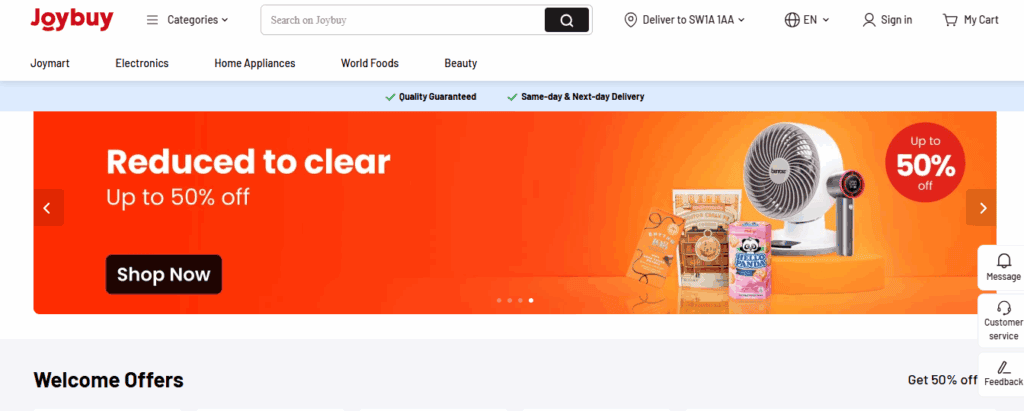
JD.com operates Joybuy (also called JD Global). Research and Markets notes that Joybuy enables overseas merchants to connect with Chinese suppliers and benefits from the advanced logistics provided by JD.com.
JD’s fulfillment network is considered one of the most sophisticated in China, with 1,300 warehouses and 200,000 delivery employees. Joybuy integrates this infrastructure with B2B services, making it an attractive option for companies that require fast and reliable shipping.
China.cn
China.cn is another B2B marketplace highlighted in the 2024 overview. While details are limited, it provides a platform for Chinese manufacturers to list products and receive inquiries. The site targets buyers who want a streamlined interface and emphasizes domestic suppliers.
AliExpress
AliExpress, a subsidiary of Alibaba Group, primarily serves consumers. However, it also supports small wholesale orders and cross-border drop shipping. It offers multiple languages, affordable pricing, and free shipping options for many products.
For micro‑retailers or entrepreneurs exploring product ideas, AliExpress can serve as a stepping stone before moving to more formal B2B channels.
How to Choose the Right B2B Platform
Once you’ve reviewed what each platform offers, the real challenge begins: deciding which one actually fits your sourcing strategy. That choice hinges less on platform features and more on how well the marketplace aligns with your operations, resources, and risk tolerance.
Here’s what to consider next:
1. Define your sourcing maturity
Are you experimenting with cross-border trade or already managing complex supply chains?
If you’re an early-stage company, prioritize ease of onboarding, simplified payments, and transparency. If you’re scaling, look for systems that support contract-based pricing, freight integration, and data-driven decision-making.
2. Map your internal capabilities
Do you have sourcing agents, Mandarin-speaking staff, or in-house logistics expertise?
If not, you’ll need platforms that minimize language barriers, offer buyer protection, and handle customs smoothly. If you do, you can tap deeper supplier networks and negotiate better deals—even if the tools are less user-friendly.
3. Focus on deal flow, not catalog size
It’s tempting to go where the most products are listed—but the real value comes from consistent, high-quality supplier engagement. Choose a platform that gives you control over RFQs, supplier filtering, and response tracking—not just one that bombards you with options.
4. Pressure-test reliability
Don’t rely on listed certifications or polished storefronts. Once you have shortlisted a platform, stress-test how it handles disputes, shipment delays, and miscommunications. A strong channel protects your downside rather than just promotes your upside.
5. Consider the hidden friction
Ask: how much of the platform’s support is built-in, and how much depends on external agents, plugins, or third parties? Platforms that offload complexity to buyers may work for experienced importers but introduce risk for SMEs without local infrastructure.
6. Think long-term compatibility
- What happens after your first deal?
- Will this platform scale with you, integrate seamlessly into your procurement systems, and evolve in line with changing trade regulations?
- Or will you outgrow it in six months?
A good match solves today’s problems and removes tomorrow’s bottlenecks.
Work With ChoZan to Win on Chinese B2B Platforms
Navigating Chinese B2B marketplaces requires more than opening an account. To succeed, you need insights, strategy, and an on-the-ground perspective. That’s where ChoZan supports global teams through four targeted services:
- China Learning Expeditions: Visit key trade hubs like Yiwu and Shenzhen to meet suppliers from 1688, Made-in-China, and JD Industrial and see how sourcing models are evolving in practice.
- China Research: Receive tailored reports on trends shaping Alibaba, Temu, and other platforms, including livestream wholesale, AI-driven supplier matching, and shifts in cross-border compliance.
- Keynotes and Workshops: Equip your leadership team with actionable frameworks for supplier due diligence, escrow innovations, and logistics optimization within China’s B2B trade ecosystem.
- Consulting and Expert Calls: Stress-test your sourcing strategy with ChoZan’s experts to identify the best-fit platforms for your industry and avoid common pitfalls in supplier negotiations.
If your next growth step involves sourcing or selling through Chinese B2B platforms, ChoZan provides the research depth, local access, and strategic clarity you need to make informed decisions in 2025.
Discover how ChoZan can help your business navigate the Chinese B2B marketplaces.
FAQs Top Online B2B Chinese Channels
Is Alibaba B2B?
Yes. Alibaba.com is one of the world’s largest B2B platforms, connecting millions of wholesale buyers with verified Chinese manufacturers and suppliers.
It focuses on global trade, offering buyer protection, escrow payments, and logistics support. Businesses use it to source bulk products, negotiate pricing, and streamline procurement across multiple industries efficiently.
What is B2B in China?
B2B in China refers to business-to-business platforms that enable wholesale trade, supplier sourcing, and cross-border e-commerce. Platforms like Alibaba, Made-in-China, and 1688 allow companies worldwide to connect with Chinese manufacturers.
They provide tools for price negotiation, product customization, logistics, and compliance, making them critical gateways for accessing China’s vast industrial supply chain.
Why use Made-in-China vs Alibaba?
Made-in-China specializes in industrial products and machinery, offering detailed supplier profiles and export certifications. Alibaba, by contrast, covers a broader range of consumer and wholesale goods.
Companies choose Made-in-China for precision sourcing in niche industries, while Alibaba remains better suited for general merchandise, retail imports, and small businesses seeking a broad product variety.
How secure are Chinese B2B platforms?
Security depends on supplier verification and platform safeguards. Alibaba offers Trade Assurance, while Made-in-China and Global Sources provide escrow and vetting services.
Buyers should always confirm certifications, request samples, and use secure payment systems. Although protections exist, risks like counterfeit goods or unreliable vendors remain, so due diligence is essential when sourcing from China.
Are livestream wholesale features available?
Yes. Many Chinese B2B platforms now feature livestream wholesale, allowing them to showcase products in real-time. Alibaba, 1688, and JD Industrial have adopted this feature, enabling buyers to interact directly with suppliers, ask questions, and view demonstrations.
This trend increases transparency, builds trust, and makes cross-border sourcing more engaging and reliable for international businesses.
Which platforms excel in logistics for small orders?
DHgate and Temu stand out for small orders, offering low minimum order quantities and integrated shipping options. They are popular with SMEs and dropshippers needing flexible logistics.
Alibaba also supports smaller orders through its network of verified suppliers. These platforms offer international buyers faster fulfillment, lower upfront investment, and improved risk management when sourcing at scale.
Can I negotiate prices directly?
Yes, Price negotiation is standard on the Chinese B2B marketplaces. Buyers often contact suppliers directly through chat or email to discuss unit pricing, order volume, customization, and payment terms.
Platforms like Alibaba, 1688, and Made-in-China encourage negotiation, especially for bulk purchases. Building long-term relationships with suppliers can also lead to favorable discounts and improved credit terms.
Do these platforms support multiple languages?
Yes. Leading Chinese B2B platforms, such as Alibaba and Made-in-China, support multiple languages, including English, Spanish, French, and Arabic. This enables global buyers to search product catalogs and communicate with suppliers without language barriers.
Built-in translation tools and multilingual customer support ensure accessibility, making these platforms convenient for international trade across diverse markets and industries.
What role does AI play in sourcing?
AI is transforming Chinese B2B marketplaces. Alibaba uses AI for supplier matching, fraud detection, and predictive demand forecasting. Platforms like JD Industrial apply AI to logistics and inventory optimization.
AI-powered chatbots enhance communication between buyers and sellers. These tools streamline sourcing by enhancing efficiency, mitigating risks, and offering more informed product recommendations based on purchasing behavior.
How do cross-border compliance rules affect sourcing?
Cross-border compliance has become a critical factor in Chinese B2B trade. Buyers must navigate customs duties, product certifications, and digital compliance regulations.
Platforms like Alibaba and Made-in-China assist by offering verified supplier documentation and compliance support. Failure to meet standards can lead to shipment delays or penalties, so businesses prioritize platforms with transparent compliance frameworks.
What is 1688.com, and how does it differ?
1688.com is Alibaba Group’s domestic B2B marketplace, focused primarily on the Chinese market. Unlike Alibaba.com, which caters to global buyers, 1688 serves Chinese wholesalers and businesses with local pricing and bulk orders.
International buyers sometimes access it via third-party agents. Its main appeal is significantly lower costs, but it requires local knowledge and proficiency in the Chinese language.
Join Thousands Of Professionals
By subscribing to Ashley Dudarenok’s China Newsletter, you’ll join a global community of professionals who rely on her insights to navigate the complexities of China’s dynamic market.
Don’t miss out—subscribe today and start learning for China and from China!
Latest posts


What Is Douyin? How Brands Are Winning Big on China’s TikTok
September 25, 2025

What Is Market Research? How It Works in the Chinese Market
September 24, 2025
SOCIAL MEDIA
Faq About Blog
About The Author
Ashley Dudarenok
Ashley Dudarenok is a leading expert on China’s digital economy, a serial entrepreneur, and the author of 11 books on digital China. Recognized by Thinkers50 as a “Guru on fast-evolving trends in China” and named one of the world’s top 30 internet marketers by Global Gurus, Ashley is a trailblazer in helping global businesses navigate and succeed in one of the world’s most dynamic markets.
She is the founder of ChoZan 超赞, a consultancy specializing in China research and digital transformation, and Alarice, a digital marketing agency that helps international brands grow in China. Through research, consulting, and bespoke learning expeditions, Ashley and her team empower the world’s top companies to learn from China’s unparalleled innovation and apply these insights to their global strategies.
A sought-after keynote speaker, Ashley has delivered tailored presentations on customer centricity, the future of retail, and technology-driven transformation for leading brands like Coca-Cola, Disney, and 3M. Her expertise has been featured in major media outlets, including the BBC, Forbes, Bloomberg, and SCMP, making her one of the most recognized voices on China’s digital landscape.
With over 500,000 followers across platforms like LinkedIn and YouTube, Ashley shares daily insights into China’s cutting-edge consumer trends and digital innovation, inspiring professionals worldwide to think bigger, adapt faster, and innovate smarter.







